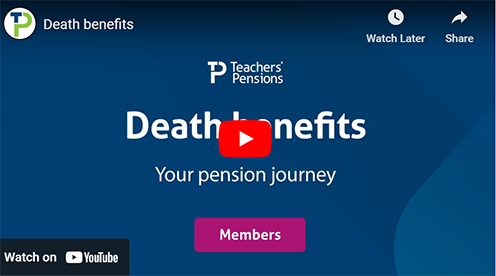
If you're a relative looking for information following a member's death, please visit our dedicated Relatives and advisors Hub.
Death grant for beneficiary or nominee
If you die in service, your surviving spouse, civil partner or qualifying surviving partner will automatically receive your death grant unless you make a death grant nomination. You can nominate an unmarried partner or someone else of your choice regardless of their age and relationship to you. You’re not able to nominate a Trust or Charity for death grant nominations. If you don’t make a death grant nomination and don’t have a surviving spouse or partner when you die, the death grant will be paid to your estate.
Watch our video to find out more about Death Benefits and your pension.
 (This link opens in a new window)
(This link opens in a new window)
If you’re on sick leave please note that under the Scheme regulations you’ll only be treated as being in pensionable service while you receive at least half of your usual gross salary. If you’re on unpaid sick leave, contributions aren’t deducted and pension benefits aren’t accrued. However, should you die within 12 months after leaving all pensionable service because you were incapacitated, an in-service death grant will be payable. After 12 months have elapsed an out-of-service death grant will be payable. Find out more about Ill-health Retirement.
If you have a terminal illness please read the guide, as it includes information about converting pension benefits to a tax-free lump sum payment. As with any financial decision, you may wish to seek independent financial advice.
It's also worth noting that this assumes that you haven’t become entitled to Age retirement (i.e. attained Normal Pension Age while out of service), or retired on any other grounds, for example, Ill-health Retirement. The exception here is if you’ve taken Phased Retirement, as a person remains in-pensionable service when taking Phased retirement.
If you die while in a period of additional service after retirement any lump sum previously paid to you as part of a teacher’s pension will be deducted from the amount of the death grant.
If you choose to nominate somebody to receive your death grant it's important to keep it up to date. You can nominate more than one person but if you want to do that you must tell us what proportion of the death grant you want each person to receive.
If you’re in the career average scheme and die in service, a death grant of three times your final full-time equivalent salary (at your date of death) will be paid.
There’s no minimum qualifying period for an in-service death grant. If you’ve nominated someone to receive a death grant and later marry or register a civil partnership that does not cancel your nomination. If you no longer want someone to receive the death grant you must revoke your nomination. It’s up to you to remember to keep your nomination up to date.
Pensions for your spouse, civil partner, qualifying surviving partner or nominated beneficiary and children
Once Teachers’ Pensions has received and processed an application form for Death Benefits a payment will be made to an adult beneficiary that is equivalent to three month’s salary. If you have dependent children three month’s salary will be paid for their benefit for the same three month period. If there’s no surviving adult, six month’s salary will be paid for the children. This will be backdated to the date of the teacher’s death. This payment is called a short-term pension. After the short-term pension ends a long-term pension will be paid.
Calculating long-term pension
After the short-term pension ends a long-term pension is paid.
Final salary scheme
If you've benefits in the final salary scheme, the long-term pension for an adult survivor is 1/160 of the final average salary for each year of your survivor benefits service plus a service enhancement which is dependent on the amount of service you have accrued and your age when you die.
If your pension was accrued in the final salary scheme and we’re going to pay a surviving adult pension:
- If there is one child, the pension is paid at the rate of 1/320th of the final average salary for each year of service from 1 April 1972
- Where there’s two or more children, it’s paid at the rate of 1/160th, divided equally among the number of children.
If a surviving adult pension isn’t payable, the child’s pension is:
- If there is one child, the pension is paid at the rate of 1/240th of the final average salary for each year of service from 1 April 1972
- Where there’s two or more children, it’s paid at the rate of 1/120th, divided equally among the number of children.
Enhancement will also be applied to the children’s pensions.
Career average scheme
If you’re in the career average scheme and you die in service the long-term pension will be enhanced and it will be 37.5% of the career average pension you have earned up to the date of your death, plus 37.5% of the amount calculated by multiplying half of the prospective service by 1/57th of the annual rate of pensionable earnings as at the date of your death. Prospective service is the period in years between the date of your death and your normal pension age.
If your pension was accrued in the career average scheme:
If a surviving adult pension is payable, the child’s pension will be:
- If there’s one child, the pension is paid at the rate of 18.75% multiplied by accrued pension
- Where there’s two or more children the pension is paid at the rate of 37.5% multiplied by accrued pension, divided equally among them.
If a surviving adult pension isn’t payable, the child’s pension is:
- For one child the pension is paid at the rate of 25% multiplied by accrued pension
- For two or more children the pension is paid at the rate of 50% multiplied by accrued pension, divided equally among the number of children.
Children’s pensions will also be enhanced.
Benefits in both scheme sections
If you’ve benefits in both the final salary and the career average schemes, a calculation will be made in respect of each scheme and we’ll pay both as one combined pension.
Further information on retirement benefits can be found in the retirement section.
You can find out more about family benefits with our Guide (PDF, 417 KB) (This link opens in a new window).
Transitional Protection changes and your decision maker
If a member who has died had service which is affected by the Transitional Protection changes, a decision maker will have to make the choice on whether that service should be in the final salary or career average scheme. This is for any pensionable service between 1 April 2015 and 31 March 2022.
More information can be found on the bespoke bereavement page (This link opens in a new window).
Last Updated:
23/10/2024 09:39